Quick Question - schooling multi-ages
-
GrannySimplicity
- Posts: 34
- Joined: Tue Sep 18, 2012 6:40 pm
- Contact:
Quick Question - schooling multi-ages
I have a what may be a dumb question but here goes.
I have a daughter who is nearly 7 and a son who is nearly 5. due to my son being severely delayed (has classic autism and developmental delays) I have to do nearly everything with him either as a visual or hands-on activity for him to learn. unfortunately, our daughter is still young enough that she see her brother doing work differently than her own and sometimes becomes jealous. she loves her own curriculum, but I think it may be a case of "the grass is always greener on the other side of the fence" when they are doing their schooling. I have fun educational apps on each of their tablets that they use. she gets to play them at intervals throughout her school day to help break it up a bit. I also spend time alone with her doing activities that she doesn't feel left out due to my having to work so much with her brother. and I missing something here? how do I help her understand at her age that her brother needs to work on his schooling in a way different that her own? his level of classic autism is on the very low end, almost to the point of having some mental retardation. (side note - many with classic autism have mild mental retardation also)
I know that other families, including those without a special needs child, can face similar issues with older kids wishing they could only do the "fun stuff" they see younger siblings doing. that is why I am asking here.
any ideas would be much appreciated. Thanks!
I have a daughter who is nearly 7 and a son who is nearly 5. due to my son being severely delayed (has classic autism and developmental delays) I have to do nearly everything with him either as a visual or hands-on activity for him to learn. unfortunately, our daughter is still young enough that she see her brother doing work differently than her own and sometimes becomes jealous. she loves her own curriculum, but I think it may be a case of "the grass is always greener on the other side of the fence" when they are doing their schooling. I have fun educational apps on each of their tablets that they use. she gets to play them at intervals throughout her school day to help break it up a bit. I also spend time alone with her doing activities that she doesn't feel left out due to my having to work so much with her brother. and I missing something here? how do I help her understand at her age that her brother needs to work on his schooling in a way different that her own? his level of classic autism is on the very low end, almost to the point of having some mental retardation. (side note - many with classic autism have mild mental retardation also)
I know that other families, including those without a special needs child, can face similar issues with older kids wishing they could only do the "fun stuff" they see younger siblings doing. that is why I am asking here.
any ideas would be much appreciated. Thanks!
Re: Quick Question - schooling multi-ages
HOD is so much fun, that everyone does want to do it all!  We do "5 minute fun" type things together (which I'll explain below), but I have found that our dc each crave to do their own guides without all the rest joining in a good portion of the time. Obviously if siblings are doing the same guide due to this being a good placement, this would not pertain, but as my dc are well placed in different guides, it makes sense they do their own. A bonus of this is each of my dc love time with me alone. Our discussions can be deeper, more personal, and more private on a level they can each understand based on their maturity. I love this! They do too. I tell them it is my special time with each of them when I am working through my teaching times with them individually. I point out "so and so" had his special time earlier, and now it is "so and so's" special time now, so don't rain on their parade - they didn't rain on yours.
We do "5 minute fun" type things together (which I'll explain below), but I have found that our dc each crave to do their own guides without all the rest joining in a good portion of the time. Obviously if siblings are doing the same guide due to this being a good placement, this would not pertain, but as my dc are well placed in different guides, it makes sense they do their own. A bonus of this is each of my dc love time with me alone. Our discussions can be deeper, more personal, and more private on a level they can each understand based on their maturity. I love this! They do too. I tell them it is my special time with each of them when I am working through my teaching times with them individually. I point out "so and so" had his special time earlier, and now it is "so and so's" special time now, so don't rain on their parade - they didn't rain on yours.  This usually works well as it reminds them they all get their own special guide, with their own special things to do, with their own special 1:1 time with me.
This usually works well as it reminds them they all get their own special guide, with their own special things to do, with their own special 1:1 time with me.  So, perhaps just reiterating this to dd and to ds throughout the day will help them each appreciate their special guides/times with you/activities each day.
So, perhaps just reiterating this to dd and to ds throughout the day will help them each appreciate their special guides/times with you/activities each day.  For your dd, I would also point out that you long to have more mature discussions/activities with her, and that likewise, as your ds is younger, you need his discussions to be scaled back some. She will probably appreciate this line of thought as your oldest (oldest dc generally like being viewed as more mature
For your dd, I would also point out that you long to have more mature discussions/activities with her, and that likewise, as your ds is younger, you need his discussions to be scaled back some. She will probably appreciate this line of thought as your oldest (oldest dc generally like being viewed as more mature  ).
). 
Now, I will be admit I don't mind the "5 minute fun" type things together though, and certain things lend themselves well to that (which I will paste from another thread I wrote years' back). For example, if someone bakes something for a history project, everyone gets to eat it and compliment the cook. Or if it's someone's turn to share a poem with someone, we can all take 5 minutes to sit on the couch, listen to the reader, and clap at the end. However, no one else takes a turn at the microphone then, as it was that child's turn to shine.
Or if it's someone's turn to share a poem with someone, we can all take 5 minutes to sit on the couch, listen to the reader, and clap at the end. However, no one else takes a turn at the microphone then, as it was that child's turn to shine.  Or if the little guy's guide called for a re-enactment of the Red Sea parting and the Israelites crossing, etc., then I can quickly assign everyone a part, give them 2 minutes to throw on some type of costume, and we can take 5 minutes to act it out. However, if something takes more than 5 minutes, or if it is clearly an assignment for just that child to enjoy doing on their level and enjoy sharing as their special thing, then we go solo.
Or if the little guy's guide called for a re-enactment of the Red Sea parting and the Israelites crossing, etc., then I can quickly assign everyone a part, give them 2 minutes to throw on some type of costume, and we can take 5 minutes to act it out. However, if something takes more than 5 minutes, or if it is clearly an assignment for just that child to enjoy doing on their level and enjoy sharing as their special thing, then we go solo.
So, overall, most of the day each child is enjoying their own guide and joining in only now and then for a 5 minute thing that gears itself toward celebrating together with the others. Everyone loves showing off their things to each other around lunch time, and I love that they each did their own thing they were able to do well. For example, even though my olders would have enjoyed doing my little guy's LHFHG's art project, it is far better that just my little guy did it because then he gets to show his project off to his older brothers without thinking his work was "less" because they'd stopped and done his LHFHG project too. Likewise, there is just a lot more interest there as they share with one another, as they didn't all do each other's things. Having dc do the things in their own guides separately keeps their things special, and it cuts down on the comparing. And, we all like having finished on time so we have time for things other than school the rest of the day.
And, we all like having finished on time so we have time for things other than school the rest of the day. 
Here are a few pics of 5 minute fun things we've done together...
LHTH activity of making music and marching to it...

LHTH activity of flying...
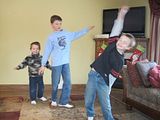

LHTH Bible activity re-enacting The Last Supper...
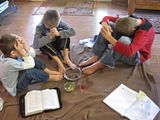
LHTH Bible story re-enacted...

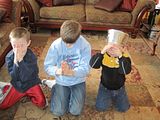

Bigger Hearts testing of the planes lift, drag, etc....

Bigger Hearts Gold Rush...
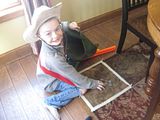
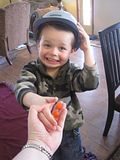
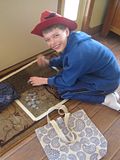
Bigger Hearts, sinking the Philadelphia (only Riley built the boat, and Wyatt only helped with the "bombing" )...
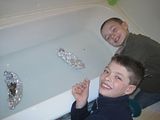
Drawn into the Heart of Reading re-enactment of battle for kickoff...
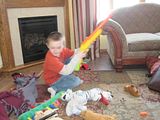
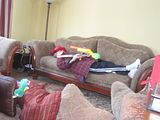

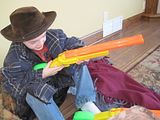
Bigger Hearts re-enactment of history story...
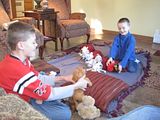
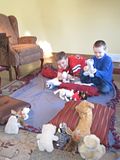
Bigger Hearts science, find the camouflaged bug...

RTR, playing history game made from history project...
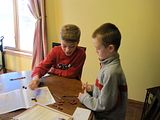
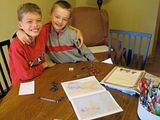
RTR, eating history project as Wyatt reads about the history event from notebook (but only Wyatt did the baking)...
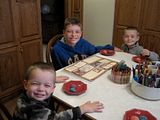
RTR, going on the Crusades, Wyatt set it all up, and the rest of the dc joined in only on the activity part, Wyatt directed it all...
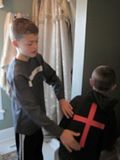


Poetry Reading...

I think it is important to know at what point in an activity to have everyone join in. Usually, we try to join in at the culmination of something. For example, if it is a cooking project, the one child whose guide the project is in is responsible for the cooking, and the other dc are not involved at that point. However, when it is time to eat the treat, everyone is part of that. If it is a science project, the child whose guide the experiment is in sets it all up, and maybe will demonstrate the outcome quickly for the rest, and the rest are observers or assistants. If it is a poetry reading or sharing orally type of project, only the child who is to share does so, and the role of everyone else is to be the encouraging audience (i.e. the rest of the dc don't then jump up and read poems too, as it was the other child's turn to "shine"). If it was a re-enactment, the child whose guide it is in leads that, and gets first pick at which role to play, and the rest of the dc are the subordinates.
In this way, dc do separate guides and are getting the most out of their learning, while still having learning moments together. I wanted to post pictures of this and try to explain it as I've had people ask me how my dc are learning together if they are in separate guides. They are doing things together, but not all doing each other's guides, as that would be too much to do in a day, and yet they are sharing through 5 minute fun type activities, and then at meal times as they proudly show their work to one another and hang it on the fridge or set it on the counter to tell dad about when he gets home. This is just one way of sharing, of course, and not everyone does it this way, but we've found each child really shines in his guide this way, and yet they are all enjoying hearing about and participating in bits and pieces of each other's learning as well.
In Christ,
Julie
Now, I will be admit I don't mind the "5 minute fun" type things together though, and certain things lend themselves well to that (which I will paste from another thread I wrote years' back). For example, if someone bakes something for a history project, everyone gets to eat it and compliment the cook.
So, overall, most of the day each child is enjoying their own guide and joining in only now and then for a 5 minute thing that gears itself toward celebrating together with the others. Everyone loves showing off their things to each other around lunch time, and I love that they each did their own thing they were able to do well. For example, even though my olders would have enjoyed doing my little guy's LHFHG's art project, it is far better that just my little guy did it because then he gets to show his project off to his older brothers without thinking his work was "less" because they'd stopped and done his LHFHG project too. Likewise, there is just a lot more interest there as they share with one another, as they didn't all do each other's things. Having dc do the things in their own guides separately keeps their things special, and it cuts down on the comparing.
Here are a few pics of 5 minute fun things we've done together...
LHTH activity of making music and marching to it...

LHTH activity of flying...


LHTH Bible activity re-enacting The Last Supper...

LHTH Bible story re-enacted...



Bigger Hearts testing of the planes lift, drag, etc....

Bigger Hearts Gold Rush...



Bigger Hearts, sinking the Philadelphia (only Riley built the boat, and Wyatt only helped with the "bombing" )...

Drawn into the Heart of Reading re-enactment of battle for kickoff...




Bigger Hearts re-enactment of history story...


Bigger Hearts science, find the camouflaged bug...

RTR, playing history game made from history project...


RTR, eating history project as Wyatt reads about the history event from notebook (but only Wyatt did the baking)...

RTR, going on the Crusades, Wyatt set it all up, and the rest of the dc joined in only on the activity part, Wyatt directed it all...



Poetry Reading...

I think it is important to know at what point in an activity to have everyone join in. Usually, we try to join in at the culmination of something. For example, if it is a cooking project, the one child whose guide the project is in is responsible for the cooking, and the other dc are not involved at that point. However, when it is time to eat the treat, everyone is part of that. If it is a science project, the child whose guide the experiment is in sets it all up, and maybe will demonstrate the outcome quickly for the rest, and the rest are observers or assistants. If it is a poetry reading or sharing orally type of project, only the child who is to share does so, and the role of everyone else is to be the encouraging audience (i.e. the rest of the dc don't then jump up and read poems too, as it was the other child's turn to "shine"). If it was a re-enactment, the child whose guide it is in leads that, and gets first pick at which role to play, and the rest of the dc are the subordinates.
In this way, dc do separate guides and are getting the most out of their learning, while still having learning moments together. I wanted to post pictures of this and try to explain it as I've had people ask me how my dc are learning together if they are in separate guides. They are doing things together, but not all doing each other's guides, as that would be too much to do in a day, and yet they are sharing through 5 minute fun type activities, and then at meal times as they proudly show their work to one another and hang it on the fridge or set it on the counter to tell dad about when he gets home. This is just one way of sharing, of course, and not everyone does it this way, but we've found each child really shines in his guide this way, and yet they are all enjoying hearing about and participating in bits and pieces of each other's learning as well.
In Christ,
Julie
Enjoyed LHTH to USII
Currently using USI
Wife to Rich for 28 years
Mother to 3 sons, ages 23, 20, and 16
Sister to Carrie
Currently using USI
Wife to Rich for 28 years
Mother to 3 sons, ages 23, 20, and 16
Sister to Carrie
-
GrannySimplicity
- Posts: 34
- Joined: Tue Sep 18, 2012 6:40 pm
- Contact:
Re: Quick Question - schooling multi-ages
thank you for the lovely response. The ideas are very good ones. My daughter is doing the Beyond Little Hearts for His Glory and our son is doing Little Hands to Heaven.
The biggest problem that we face is that our son is very low functioning autistic. Unlike those with the higher functioning Asperger's or PDD-NOS, he is cannot do the lessons as given in the manual. I have to adapt everything to match his cognitive and physical ability level. What may take a typical child 3 steps to learn takes our son 30 steps. We began using HOD several months ago and he is still only at unit 5.
I have been making flannel board activities to go along with his lessons. These help him to learn much easier. That is just one example. In his fine motor skills, he has the ability level of a child much younger than his age. He never developed it naturally and still doesn't easily pick up things with his fingers. He cannot speak and uses a communication board or other such means to communicate. i.e. to show he understands his colors he will point to a color on a poster/chart. Teaching him requires constant one-on-one attention. It was only recently that I have been able to give him an activity to do (such as pulling pegs from the rubber mat to strengthen his hands) and he can work on it independently. While working with him, our daughter does her copywork, math, or reading practice. When our son is finished with his work for the day, I work with our daughter while he rests or plays in his bedroom.
Our daughter loves the curriculum. I think she just doesn't really understand that her brother's level of disability requires that he learn in a completely different way than she does.
The biggest problem that we face is that our son is very low functioning autistic. Unlike those with the higher functioning Asperger's or PDD-NOS, he is cannot do the lessons as given in the manual. I have to adapt everything to match his cognitive and physical ability level. What may take a typical child 3 steps to learn takes our son 30 steps. We began using HOD several months ago and he is still only at unit 5.
I have been making flannel board activities to go along with his lessons. These help him to learn much easier. That is just one example. In his fine motor skills, he has the ability level of a child much younger than his age. He never developed it naturally and still doesn't easily pick up things with his fingers. He cannot speak and uses a communication board or other such means to communicate. i.e. to show he understands his colors he will point to a color on a poster/chart. Teaching him requires constant one-on-one attention. It was only recently that I have been able to give him an activity to do (such as pulling pegs from the rubber mat to strengthen his hands) and he can work on it independently. While working with him, our daughter does her copywork, math, or reading practice. When our son is finished with his work for the day, I work with our daughter while he rests or plays in his bedroom.
Our daughter loves the curriculum. I think she just doesn't really understand that her brother's level of disability requires that he learn in a completely different way than she does.
Re: Quick Question - schooling multi-ages
Your daughter is still very young, so I can understand why she is feeling this way. I imagine you have explained to her and she can see how much extra it takes for your son to learn. I wonder whether when working with her focus on the great things she is doing and how exciting it is. I guess all I'm thinking is the more positive she feels about her work and her activities the better she possibly will feel. Can you possibly involve her in some way to help your son? Is there something that perhaps she could try and teach him? I haven't an autistic child, but I do have a very academically delayed chap who loves having his oldest sister occasionally take over some of his teaching. It is lovely to watch them together. So while I suggest it, you will know whether that would work.
Michelle, Mum homeschooling four beauties in NZ
DD1 (13): Rev2Rev, DITHR
DD2 (11): CTC, DITHR
DS1 (8): BHFHG
DS2 (4): LHTH
DD1 (13): Rev2Rev, DITHR
DD2 (11): CTC, DITHR
DS1 (8): BHFHG
DS2 (4): LHTH
-
LovingJesus
- Posts: 337
- Joined: Thu Oct 27, 2011 8:29 am
Re: Quick Question - schooling multi-ages
Have you talked to her about his particular autism and what it really means for his life? What it means for his schooling over the years? What it means for your family?
My youngest has Down Syndrome. We have had to talk a certain amount about what that really means for different reasons then yours. The more they 'understand' the more I see their compassion towards her and some of the challenges she brings to daily life.
They know that she might not be able to start true Kindergarten work until age 9 or 10. Yes, there was a little jealousy over the fact sister won't have to do school like them! They actually wondered if she was able to skip it entirely; no, of course being the answer!
Can she join in on any of the learning she wishes she had? My two middle children love to sit in and listen on my dd3, with Down Syndrome, reading school time that is about 30 minutes a day. It is relaxing and fun for them. Perhaps if she can join in some it will help.
I hope something I said was helpful.
My youngest has Down Syndrome. We have had to talk a certain amount about what that really means for different reasons then yours. The more they 'understand' the more I see their compassion towards her and some of the challenges she brings to daily life.
They know that she might not be able to start true Kindergarten work until age 9 or 10. Yes, there was a little jealousy over the fact sister won't have to do school like them! They actually wondered if she was able to skip it entirely; no, of course being the answer!
Can she join in on any of the learning she wishes she had? My two middle children love to sit in and listen on my dd3, with Down Syndrome, reading school time that is about 30 minutes a day. It is relaxing and fun for them. Perhaps if she can join in some it will help.
I hope something I said was helpful.
-
GrannySimplicity
- Posts: 34
- Joined: Tue Sep 18, 2012 6:40 pm
- Contact:
Re: Quick Question - schooling multi-ages
Thank you. She does help him with some of his schoolwork. One thing she did on her own was ask him to sit with her on the couch when she does her independent reading. She reads the stories to him. She is getting her own reading practice in, but says she is reading to her brother so that he can hear the stories too. Overall, she is very compassionate towards him.
We are starting something new this week. I set a timer for 30 minutes. She as that amount of time for each subject. If she finishes early, then she can do whatever she wants for the remainder of the time. If she doesn't finish, she sets that assignment aside to be finished later after the other subjects are done. Every third "subject" is a totally different type of activity. She can watch a video on her tablet, play outdoors, or some other fun activity that is not particularly school related. So far this morning, she has enjoyed this. Work is done before the timer rings and she is able to take frequent breaks. When the timer goes off, she gets back to the next subject on the list.
We are using workboxes. She has all of her work in them and uses a visual schedule to keep her on track. I did this for several reasons. First, she will be using the same organizational method as her brother, which she enjoys. Second, it gives her a sense of control over her schooling. And third, it provides the visual motivation to get the work done as she watches the tags on her visual schedule disappear.
The tags we are using are made from the graphics icon in the teacher's manual. I have 2 small pocket charts that have a storage pocket along the bottom. The kids remove the subject tag from the pocket chart and place it in the storage pocket when completed. The extra activities (playing outdoors, watching a video, etc) are made into tags also using graphics found online.
I have also included an activity center. It is a small table set up with a choice of activities. The first center may be a choice of 2-3 simple science activities that go along with the current unit's lessons. Another center theme may be geography, which she loves. She has a notebook of the states that Daddy is truck driving in and does a page for whatever new state he is driving in. She also likes to do maps of the current history lessons. Then of course, there are file folder games and arts & crafts that can be made into center activities. She is loving the choices. Also, this is something that is specific to her alone. Her little brother has no interest in any of it, nor is he able to do 98% of it. His learning center is made up of things like puzzles and manipulative activities that build up his fine motor skills. I am making sure that the last center is a choice of 2-3 board games to play with Momma. She loves that!
Overall, the homeschool setting looks very relaxed and seems to have been the thing she needed. She finished her math quickly, so was able to help her brother with his pegs & rubber mat activity. She loads the mat and helps hold it down as he pulls the pegs out. She is finding out that if she completes her own work before the timer goes off, she is able to do an activity with her brother.
Thank you for the ideas and encouragement.
We are starting something new this week. I set a timer for 30 minutes. She as that amount of time for each subject. If she finishes early, then she can do whatever she wants for the remainder of the time. If she doesn't finish, she sets that assignment aside to be finished later after the other subjects are done. Every third "subject" is a totally different type of activity. She can watch a video on her tablet, play outdoors, or some other fun activity that is not particularly school related. So far this morning, she has enjoyed this. Work is done before the timer rings and she is able to take frequent breaks. When the timer goes off, she gets back to the next subject on the list.
We are using workboxes. She has all of her work in them and uses a visual schedule to keep her on track. I did this for several reasons. First, she will be using the same organizational method as her brother, which she enjoys. Second, it gives her a sense of control over her schooling. And third, it provides the visual motivation to get the work done as she watches the tags on her visual schedule disappear.
The tags we are using are made from the graphics icon in the teacher's manual. I have 2 small pocket charts that have a storage pocket along the bottom. The kids remove the subject tag from the pocket chart and place it in the storage pocket when completed. The extra activities (playing outdoors, watching a video, etc) are made into tags also using graphics found online.
I have also included an activity center. It is a small table set up with a choice of activities. The first center may be a choice of 2-3 simple science activities that go along with the current unit's lessons. Another center theme may be geography, which she loves. She has a notebook of the states that Daddy is truck driving in and does a page for whatever new state he is driving in. She also likes to do maps of the current history lessons. Then of course, there are file folder games and arts & crafts that can be made into center activities. She is loving the choices. Also, this is something that is specific to her alone. Her little brother has no interest in any of it, nor is he able to do 98% of it. His learning center is made up of things like puzzles and manipulative activities that build up his fine motor skills. I am making sure that the last center is a choice of 2-3 board games to play with Momma. She loves that!
Overall, the homeschool setting looks very relaxed and seems to have been the thing she needed. She finished her math quickly, so was able to help her brother with his pegs & rubber mat activity. She loads the mat and helps hold it down as he pulls the pegs out. She is finding out that if she completes her own work before the timer goes off, she is able to do an activity with her brother.
Thank you for the ideas and encouragement.
-
mrsrandolph
- Posts: 717
- Joined: Mon Aug 04, 2008 9:21 pm
- Location: Cartersville, GA
Re: Quick Question - schooling multi-ages
Ah... I can relate. My 10 year old daughter is typically developing and advanced. My 9 year old son has some learning issues. They are both in Preparing, but I have to spend a LOT more time with him.
In my case, however, it is my son who has the "issues". "Why do I have 'baby work'" etc.
There is a WONDERFUL book that you MUST GET. It is called "A Walk In The Rain With A Brain" by Edward Hallowell. It is a picture books that explains so well to children that all kids learn differently and that there are different kinds of "smart".
Hope that helps.
In my case, however, it is my son who has the "issues". "Why do I have 'baby work'" etc.
There is a WONDERFUL book that you MUST GET. It is called "A Walk In The Rain With A Brain" by Edward Hallowell. It is a picture books that explains so well to children that all kids learn differently and that there are different kinds of "smart".
Hope that helps.
Shannon Randolph LOVING HOD & Running 4 Guides & DITHOR
Mommy to 4 Precious Blessings
Cassie (15- World Geography),
Will (14- Rev2Rev,
Ellie (12- Res2Ref), and
Jack (10- CTC)
Mommy to 4 Precious Blessings
Cassie (15- World Geography),
Will (14- Rev2Rev,
Ellie (12- Res2Ref), and
Jack (10- CTC)